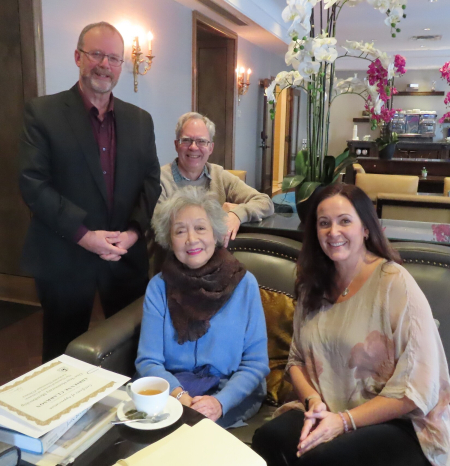In January 2024, Andrea Bissonnette, Ben Weiss and myself had an extraordinary experience—the opportunity to sit down with Madame Adrienne Clarkson at the Château Laurier Hotel to have tea and chat about her past and Ottawa history more generally. For those who might need a reminder, after a stellar career as a journalist, Madame Clarkson was Canada’s governor general from 1999 to 2005, and the Historical Society of Ottawa’s patron.
The story began in the spring of 2023 when Andrea contacted the Historical Society of Ottawa regarding an old family photograph album that had originally belonged to her grandmother, Marie Albina Guilbeault. Andrea had inherited it following the passing of her mother, and offered the photos to the Society.
Although the Society no longer maintains a photo archive, we agreed to go through the album, scan photographs of interest, and then send the collection to the City of Ottawa Archives. Among Andrea’s fascinating photos was a picture of her great-grandfather, Arthur Guilbeault, who was a mayor of Eastview (Vanier) in the 1920s, and another of Zoë Laurier, the wife of Sir Wilfrid Laurier.
It took us some months to go through the album in detail. In January, Ben Weiss read a number of newspaper clippings, snipped by Andrea’s grandmother, about her son, Andrew (André) Bissonnette, who was Andrea’s father. Representing the Ottawa Technical Institute, Andrew had won third prize in a Rotary Club public-speaking contest held on April 1, 1955 at the Château Laurier Hotel. Perusing the articles more closely, Ben recognized the name of the second-place winner—16-year-old Adrienne Poy, the young immigrant girl from Hong Kong who was to become Canada’s 26 th governor general.
Ben contacted Madame Clarkson’s office and offered to send the newspaper clippings to her as a gift. Instead, Madame Clarkson graciously volunteered to receive them in person as she was soon to be in Ottawa to give an address on leadership at Carleton University.
After meeting at the City of Ottawa Archives where Andrea officially donated her grandmother’s photographs, Andrea, Ben and I trooped down to the Château Laurier, expecting a brief meeting with Madame Clarkson. Instead, she spoke with us for more than an hour. It seemed like she would have happily chatted longer had it not been for another appointment (which turned out to be with none other than Randy Boswell, the well-known journalist, professor and Society member!).
Madame Clarkson was delighted to receive the clippings and recalled the Rotary contest in detail. In the lead-up to the event, she had practised under the direction of her English teacher, Mr. Mann. She entered the Rotary inter-school contest by winning a similar public-speaking event at her school, Lisgar Collegiate. Madame Clarkson said that Mr. Mann had had a profound influence on her, giving her skills that had served her well through her life.
The topic of her young Adrienne Poy’s twelve-minute presentation was “The Problem of China.” She also had to speak extemporaneously for two minutes on the postal system. She clearly impressed the judges and the reporters covering the event. Indeed, her speech garnered more press coverage that that of the first-place winner, Tony Reynolds from Glebe Collegiate, who spoke on “Moral Rearmament.” Madame Clarkson recalled that “moral rearmament” had been a popular, neo-fascist philosophy during the 1950s. (A 1967 article that appeared in The Harvard Crimson called the movement simplistic, anti-intellectual, emotional, and irrational.) Madame Clarkson said that her second-place finish had come as a disappointment; she had hoped to take first place. Indeed, there had been a general feeling that she had performed better than Reynolds but lost owing to her gender. In the 1950s, women did not come first.
Responding to a question from Andrea, Madame Clarkson admitted that while she knew Andrea’s father, Andrew Bissonnette, she did not know him well. She gave Andrea a hug when Andrea revealed that she had never met her father as he had tragically died while her mother had been three months pregnant with her. To talk to somebody who had known her father, even a little bit, was very special.
Madame Clarkson went on to speak about her early life in Ottawa after her family arrived as refugees from Hong Kong in 1942. Her first recollection was falling off the steps of a streetcar. Landing in a snowbank, three-year old Adrienne Poy was fortunately uninjured. She also recalled that her mother didn’t know how to cook when they first arrived in the city. Francophone neighbours taught her how to prepare Western food. Later, Mrs. Poy learnt how to cook Chinese cuisine at a Chinese restaurant. Subsequently, the Poy family ate Chinese food on weekdays and Western food on weekends.
She also described the social and religious divides in Ottawa at the time—English versus French, Irish versus Francophones in Lowertown, and Catholics versus Protestants. One thing she did not experience was anti-Chinese bias, possibly because there were so few Chinese in Ottawa owing to the 1923 exclusion law that barred most Chinese from emigrating to Canada until 1947. But, even within Ottawa’s small Chinese community—just two Chinese restaurants—there was a divide between those who had owned land back in China and those with a water, or fishing background. Her mother would not allow young Adrienne to bring home Chinese children with a fishing heritage.
One thing that was strong in the Poy household was their attachment to the Anglican Church. Madame Clarkson’s parents had been married in Hong Kong by Bishop Ronald Hall, who became famous for the ordination of Florence Li, the Anglican Church’s first woman priest, in 1944. After living in an apartment on Sussex Avenue, the Poy family later moved to Laurier Avenue west to be closer to Christ Church Cathedral where her parents were active members.
When asked about why her family remained in Canada after the war, Madame Clarkson said that her parents had considered going back to Hong Kong. Indeed, many Hong Kong friends were expecting and hoping that they would return. However, her father, William Poy, was concerned about the future of the British colony given the rise of Mao Zedong, fearing that Hong Kong could not last more than two years after Mao’s takeover of mainland China. While his fears later proved to be mistaken, the family stayed in Ottawa.
Noting that her upcoming birthday fell on the Chinese New Year, Ben asked Madame Clarkson if that had any significance for her. She laughed, saying that it did for her mother. Mrs. Poy spent the last three weeks of her pregnancy in bed in the hope that her child would be born a “rabbit” instead of a “tiger.” Failing in that endeavour, she despaired that young Adrienne’s character would be too forceful, making it difficult for her to find a husband.
Madame Clarkson also talked about senior government positions. She said she had turned down an offer to become a senator as she felt that she didn’t have the temperament for the job. While she could do committee work, it wasn’t her preferred type of activity. The role of governor general was more in keeping with her leadership skills. One position she has particularly enjoyed is being Colonel-in-Chief of the Princess Patricia’s Canadian Light Infantry, a role she has had since 2007. Madame Clarkson noted that she was only the third Colonel-in-Chief since the formation of the regiment in 1914, and is proud to be the first Canadian.
With her assistant indicating that it was 3:30pm, and time for her next appointment, Andrea, Ben and I gave our thanks and said our goodbyes. Before going, Ben gave Madame Clarkson a copy of Dorothy Phillips’ book on the Duke and Dutchess of Devonshire, Victor and Evie, British Aristocrats in Wartime Rideau Hall as well as Bill Galbraith’s work on Lord Tweedsmuir titled John Buchan: Model Governor General. He also gave honorary membership certificates to both Madame Clarkson and Andrea. We hope that both are able to join us for future events.






